Macedonia: 4 Distinctive Guesthouses for a Nature Getaway
Four guesthouses set in unique landscapes,...
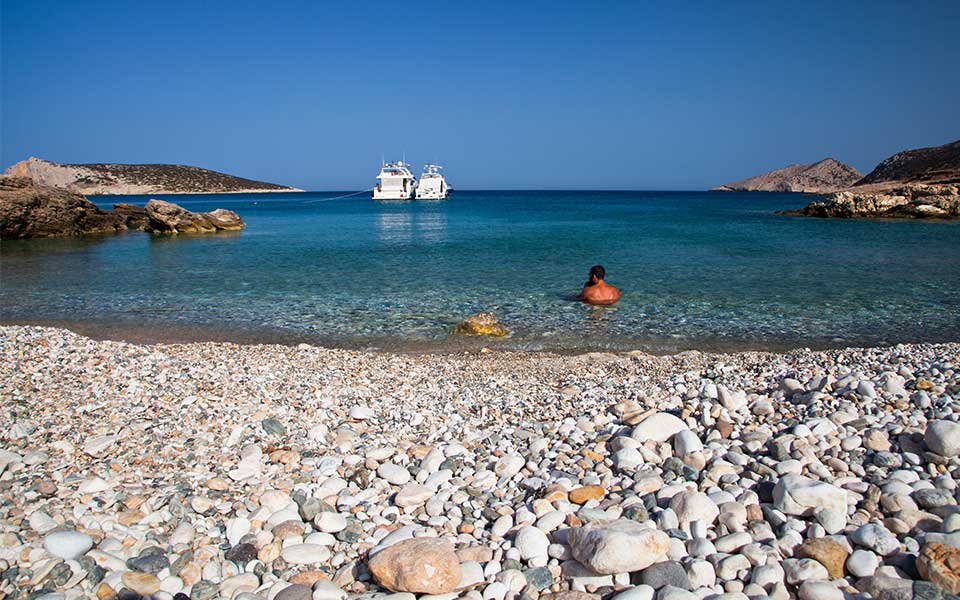
Donoussa
© Olga Charami
On May 25, the final restrictions on traveling around Greece due to COVID-19 were lifted. For me, the date represented independence day, as I am once again able to visit my most favorite Greek destinations for the umpteenth time.
You’ve all experienced that fluttery sensation in your stomach or the lump in your throat when somewhat emotional. This is how I always feel whenever I visit the following five special locations in Greece:
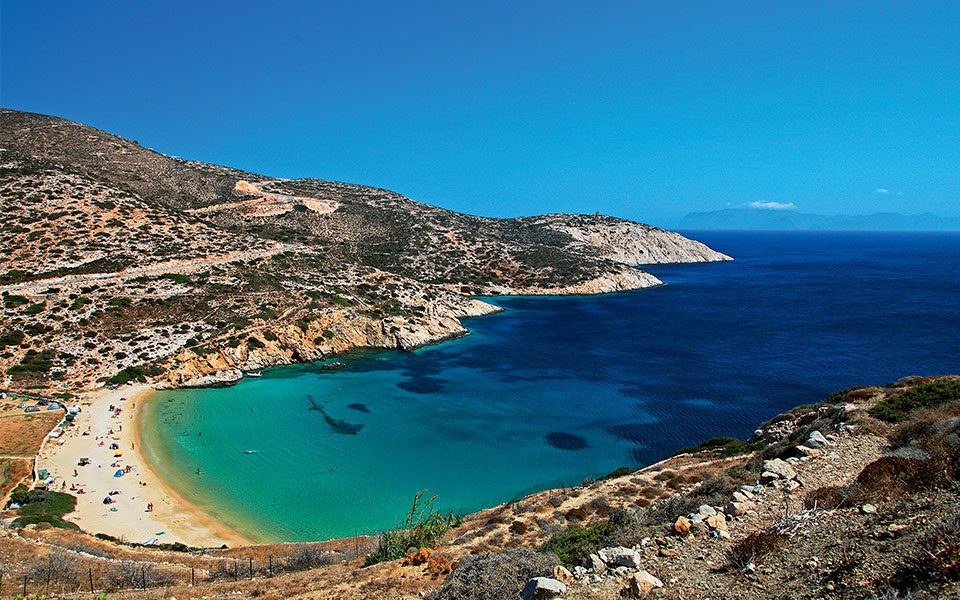
Donoussa
© Olga Charami
Every August, shortly before I set foot on the island of Donoussa, my longing is so strong that I feel like a child about to eat her favorite ice cream. August may not be the best month to visit the island because of the crowds, but the island has already conquered my heart countless times and I would pick it over any other in an instant.
My hideout there is Kalotaritissa, in the northeastern part of the island. Whether I drive there, or hike to it along my favorite path, which starts from the port and takes about an hour to cover, the first sight I get from above is that of the giant bay, the barren hills, the tiny settlement of small, scattered houses, most of which are abandoned and, of course, the pristine waters that make my heart sing.
I suddenly lose all sense of patience and start practically rolling down the rocks until I get to the beach – either the sandy Mesa Ammos or the neighboring pebbly Sapounochoma. I dive my head into these magical waters, the coolness of which drains my mind of all worries. I follow the sun all day until it sets, seeking its heat at times or some shade at others.
At twilight, still in my bathing suit, I head to Mitsos’ small taverna back in Kalotaritissa. Beer, homemade delicacies and the Lempesis family make for a cinematic climax, while the grand finale occurs when the moon rises and bathes the bay in its light, as well as Skylonisi, the small rocky island in the middle of it. A film fit for the Oscars.
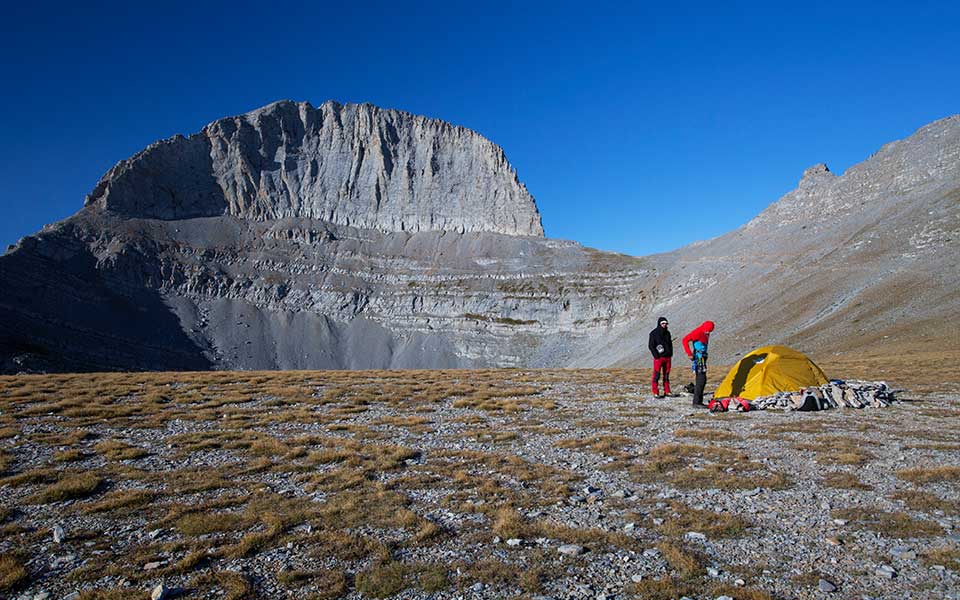
Mt Olympus
© Olga Charami
There is something about Mt Olympus that deeply moves me: Is it its energy? Is it all the myths about the 12 Gods that used to live here? Is it its beauty, its nature – protected as a national park? Is it the fact that it’s the highest mountain in Greece? In my opinion, it’s all of these things combined that make it such a unique place.
Every time I arrive on the Plateau of the Muses, at an elevation of 2,500m, my breath is cut short, and not because I have spent the previous 6 to 11 hours walking along cliffs. I see the otherworldly Stefani summit – also known as the Throne of Zeus, the peace reigning over the plateau, the mysterious clouds rising above the Kazania slopes. The two mountain refuges and the people there seem like small toys in the face of its grandeur.
The awestruck feeling you get the minute you step on Mt Olympus will stay with you even after you leave. You can never simply “get used to it.” Whether you come in summer, when the hillsides are crowded with visitors and tents, or winter, when you have the place almost to yourself, the mountain takes you under its spell. And you remain under it, even after you come down.
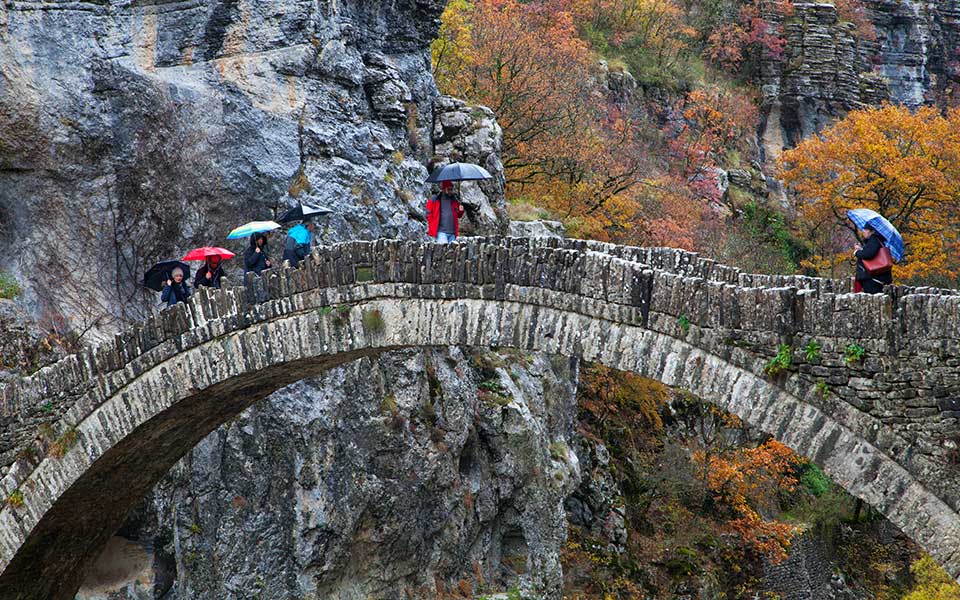
Zagori
© Olga Charami
“It is forbidden to see a bridge and not walk on it: By walking on a bridge, one gives life to it,” a dear architecture teacher of mine once told me. He was fond of the Zagori region; I never forgot him, nor disobeyed his rule on bridges, so moved was I by those words.
I stroke the stones of the wall as I sit on the cobbled path over Kokkori bridge, marveling at the expertise needed to place the keystones, to create the arches, to construct the bridge in the 18th century in such a way that it would withstand the forces of water and time.
People must have been in dire need of communication to manage to tame these inaccessible parts of the Greek mainland by building these elegant works of art. They succeeded thanks to the great passion and devotion they invested in their work and thanks to nature, the greatest of teachers; the constructions look more like an extension of the surrounding environment rather than a product of human intervention.
You often come across these bridges during beautiful hikes around the area, which form part of a large network of paths that cross imposing mountains and ravines, rivers, “dragon lakes”, the Vikos Gorge – one of the deepest in the world – in the Vikos-Aoos National Park, one of UNESCO’s Global Geoparks.
On your way, you will encounter villages with stone houses, small bridges, cobbled alleys, rivers to splash around in, dense forests, rare herbs waiting to be discovered, and traces left by wild animals. It is rare to feel so strongly united with nature!
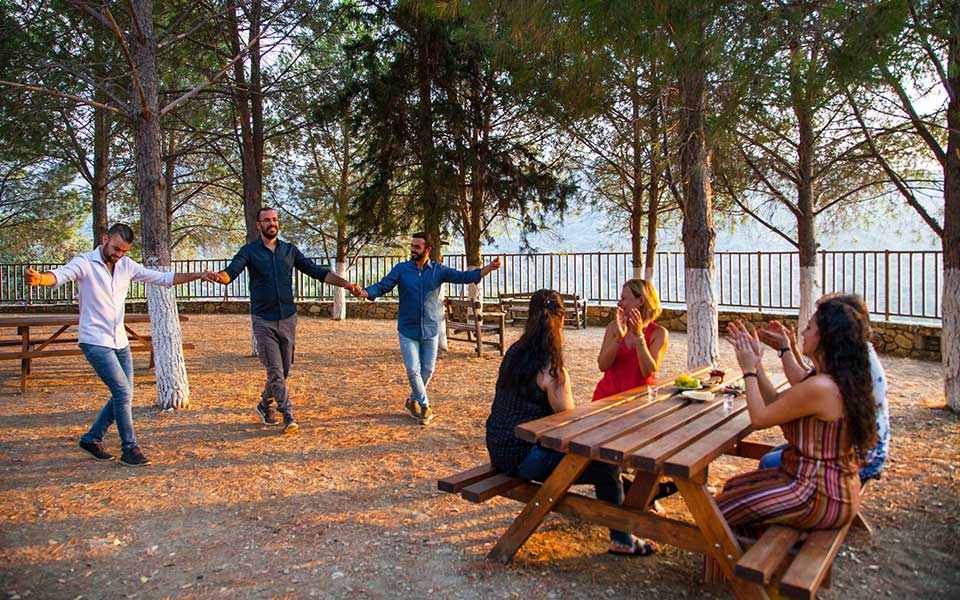
Crete
© Olga Charami
I have been to Crete countless times and I still get the same feeling whenever I get wind of a feast, a festival, a parea (“gathering”), what locals call the small improvised celebrations that often arise. Cretans never stop partying, whether it’s at the copper stills that produce tsikoudia (a type of pomace brandy also known as raki) in the autumn, in the flower-filled fields in the spring, at summer festivals, or at the myriad impromptu celebrations in homes and traditional cafés any time of the year.
As soon as I hear the sound of the lute, lyra or violin, the mantinades (a type of rhyming couplets, often sung) and the Cretan dialect; as soon as I see the men in black shirts, and their acrobatic leaps as they dance, I get into a state of inexplicable euphoria, like the pleasant headiness provoked by drinking a fews glasses of tsikoudia, even if I haven’t yet had a drop.
The exhilaration is most probably caused by the Cretans themselves, who transmit the joy they take in their traditions, along with the honesty of their emotion. Their warm welcome, their hospitality, the pure unadulterated Cretan music, their passion when they dance, their loudness once they are drunk and hear their favorite tune – it all comprises a lively tradition which may be multi-layered in its complexity, but also completely disarming in its seeming spontaneity.
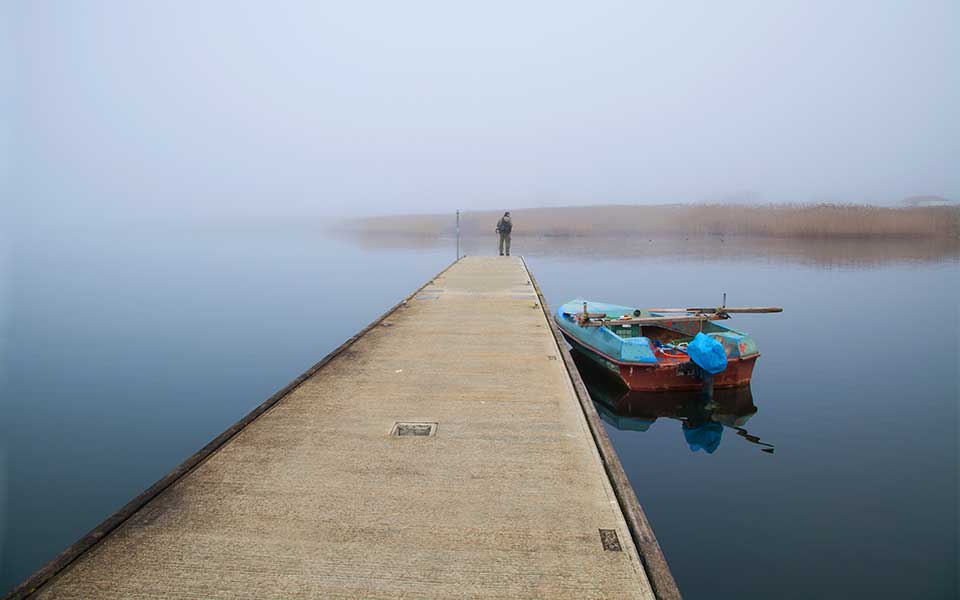
Prespa Lake
© Olga Charami
On a summer day surrounded by serene waters, I crossed the bridge leading to the islet of Aghios Achillios in Small Prespa Lake. On a spring day, I visited the Hermitage of Panaghia Eleousa in Great Prespa, bordering Albania and North Macedonia.
On an autumn day, I went to the Aghios Germanos distillery, surrounded by Balkan musicians and a lot of tsipouro. On a winter evening, I was surrounded by a dense fog that hid everything at Mikrolimni.
This is what Prespa does to you: you get lost in it. It is as if you have been possessed by something that strips you down, explores your insides, empties you and, eventually, heals you. The experience may seem metaphysical, but it is rather therapeutic.
Prespa constitutes a marginal point, at the intersection of three nations: Greece, Albania and North Macedonia, with everything that implies; it also carries the heavy legacy of the Greek Civil War. At the same time, it is Greece’s largest national park, a precious ecosystem with captivating landscapes.
Four guesthouses set in unique landscapes,...
Where tropical fruit trees thrive beside...
Six Athenians tell us about their...
We spent seven days at Nefeli...